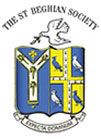|
 |
The Old St Beghian | |
| July 2016 | |||
The Somme – 1916
This year marks the centenary of the great battle of the Somme, which began on the 1st July 1916. A number of enquiries have come to the archives about Old Boys who were involved in this event. Our school magazines of the period are full of obituary notices and two, taken at random, are reprinted below as a way of commemorating the great sacrifice made by so many of our predecessors.
Lieut. J. W. Robinson.
Yet another Grindal House boy has gone in the person of Lieut. J. W. Robinson who was killed on November 18. He entered the school in 1908 and left in 1911 to join a firm of solicitors in his native town of Hexham, and was studying for his final examination at the outbreak of the war. He then joined the local battalion of the Northumberland Fusiliers and was gazetted Second-Lieutenant in September, 1914. He went out to France in April, 1915, and was wounded after being out only a few days. After recovery he was on home duty until November, when he went out again and took part in nearly all the fighting which occurred until his death. He was then in command of his company, and would shortly have been gazetted Captain. A successful attack had been made on the German trenches, which were occupied by his men, and Robinson, as his duty was, went out to reconnoitre and find out where the enemy were, and in doing this he was killed instantaneously. A brother officer writes: “He will be terribly missed in the Regiment, where he was a great favourite with officers and men. He was sterling to the core and that he died gloriously carrying out a most dangerous and arduous duty will not surprise us who have loved and served with him out here.”
Second-Lieut. W. O. Forster.
We regret to announce the death of Second-Lieut. W. O. Forster, only son of Mrs Forster of Dene Side, Low Fell, who died of wounds on Sept. 22, 1916, aged 23 years. He came to St. Bees School in 1906, and left in 1909 when he took up law as his profession. In January, 1915, he joined the O.T.C. and received a commission in the Durham L.I. in March. He was wounded on Sept. 20. His Company Officer writes “The Battalion was being relieved from the trenches and your son, who, as my second in command had been left in the transport, had come up to guide the company back to the rest area. He saw all the company clear but refused to go till I had come. I duly arrived and he said he was so pleased to see me alive. Just then a stray shell burst about 50 yards away and a piece of casing, just missing me by a few inches, wounded your son just below the chest. With the assistance of my orderlies and C.S.M. we bandaged him and carried him to the dressing station. I left him full of life and quite conscious, and was very hopeful he would pull through but it seems the shock to the system was too much.” His Colonel says of him in writing to his mother “your son was a fine officer and very popular with officers and men and we shall all miss him very much.”
Home
The St Beghian Society
St Bees School,
St Bees, Cumbria, CA27 0DS.
Tel: (01946) 828093 Email: osb@stbeesschool.co.uk
Web: www.st-beghian-society.co.uk
![]()